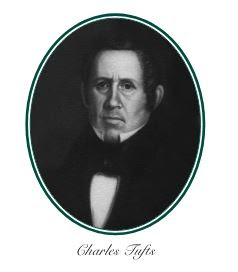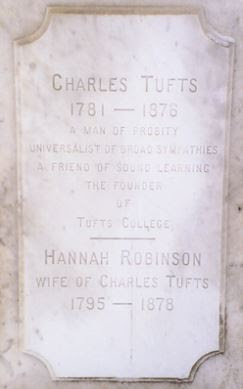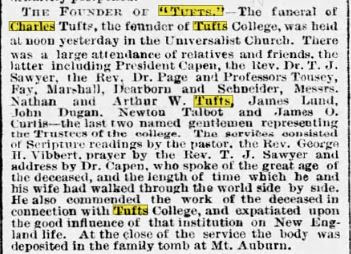#63 UNIVERSITY BENEFACTOR
CHARLES TUFTS
In 1793, the
Universalist Church emerged as a distinct Christian denomination in the United
States. It rejected the Puritan emphasis on the select few, the Elect, who were the only ones who would be saved from eternal damnation by a just God. Universalists also rejected
the doctrine of original sin and proclaimed a belief in a loving God who would ultimately redeem all human beings and grant everyone universal salvation. Universalism
is a “liberal religious movement characterized by a free and responsible search
for truth and meaning.” Universalists assert no creed, but instead are unified by their
shared search for spiritual growth.
In the 1840s,
this Church wanted to open a college in New England more affordable than the expensive
colleges.
Charles Tufts had inherited Walnut Hill, barren land on top of one of the highest points in the Boston area. Asked by a family member what he intended for it, he supposedly said, “I will put a light on it.” He then donated 20 acres (then valued at $20,000), to the Church to establish its college. When the college incorporated in 1852, it was named for Tufts as thanks for his benefaction. Charles later donated more than 100 acres of land, money for construction and his estate to Tufts. He served on the Board of Trustees from 1856 until his death.
Boston Evening Transcript Mar 6, 1852
Tufts is the third oldest college in the Boston area. The official college seal, bearing the motto, Pax et Lux (Peace and Light) was adopted in 1857.
The blue and brown school colours were adopted in 1857. Jumbo became Tuft's mascot when P.T.Barnum gave a natural history museum to the university. In 1892, women were admitted to the college.
Charles Tufts was born July 16, 1781, in nearby Medford, Massachusetts. His father, Daniel, was a farmer and bricklayer and perhaps also engaged in slaughtering and tanning. Charles was deaf and lacked formal education, but he was determined and self-taught. He was also very religious. He made his fortune in brick manufacturing and he inherited a large amount of land in Medford and Sommerville. He married Hannah Robinson (1785-1878) in 1821. That same year he built a two-story home in Somerville; when this house was razed, the stones from the front steps were moved to the campus. Charles and Hannah had no children.
Charles died, aged 95, in Somerville, Massachusetts on Christmas Eve, 1876 and is buried in Mount Auburn Cemetery in Cambridge.
Mount Auburn Cemetery, Cambridge, MA
His legacy includes Tufts University, and the World War II Liberty Ship, SS Charles Tufts.
CHARLES TUFTS
b. July 16, 1781 in Medford, Massachusetts m. Hannah Robinson (1785-1878) on April 8, 1821 in Lexington, Massachusetts d. December 24, 1876 in Someville, Massachusetts my 5th cousin 6x removed (Homuth-Pierson-Farnum lines)
















Comments
Post a Comment